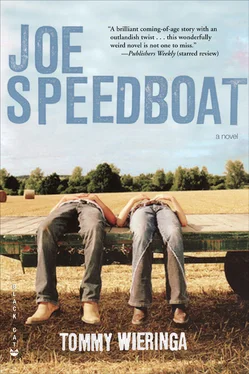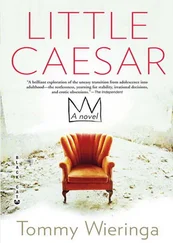‘Good morning, dearie,’ Ma says when she comes in in the morning. ‘How’s about a nice cup of coffee?’
To that end she brings with her a faded plastic vacuum flask from which she pours strong Java. I drink my coffee with a straw, just like all other hot beverages that can cause second-degree burns when you knock them over in your own lap. My favourite straws are the flexi ones you can bend to a forty-five-degree angle. Ma makes my bed, then sits down at the table.
‘Oh, that’s nice. It was time to take a load off.’
That’s just the way she talks, her words are pure comfort. And that’s how she keeps the peace around here. Ma’s kind of small, but still she’s a mountain of a woman. Her flanks are covered with a floral-patterned dress. She tells me things she’s heard from other women. Usually about disasters. She likes disasters the way she likes cookies with her coffee. I listen to news of accidents, illnesses and bankruptcies. By talking to each other all the time about other people’s misfortunes, women pass fear along. Fear with a capital F. And although they feel compassion for the luckless bastard in question, they’re thrilled that it happened a few doors down; the volume of suffering in the world is divided into unequal portions, and the bigger the neighbours’ portion the smaller yours will be. Sometimes there’s information in there that I’ll be able to use someday for my History of Lomark and Its Citizens (don’t laugh). Looking at Ma as she talks, the melancholy love I feel seizes me right by the throat.
We’re condemned to each other; me, her damaged fruit and very personal catastrophe, and she, who, like old horses, carries the world’s suffering on her back.
From this side of the table at least she seems to be getting smaller. I’ll be around long enough to see her grow completely translucent and then disappear without protest from the face of the Earth — good mother Marie Hermans, née Maria Gezina Putman. Always there to lend a helping hand, a good woman and a loving mother. God rest her soul.
At the registrar’s office in the town hall I once tried to find out about the background of the Putman family, but got no further than Lambertus Stephanus Putman, the first Putman to live in Lomark. He came here in 1774, betrothed to a local girl. They didn’t marry in the village itself, but just across the border; in those days after the Reformation the Catholic Church was banned around here. Lambert drowned in the great dyke-break of 1781, but with five children he had scattered enough seed to become the patriarch of a new Lomark family.
Not a family that made much of an impression, though. Only a few things have been preserved in the ‘Old Judiciary Archive of the Right Seigniory of Lomark’, such as cadastral drawings, deeds, procès-verbals and baptism certificates. Whenever a Putman had to sign something it almost always says, ‘This cross being the signature of So-and-so Putman, having declared the inability to write.’
Even the crosses weren’t very good.
They worked at the brickyard or as fishermen or farmers with a few fruit trees in the orchard, and that was pretty much it.
I think about them often. The air I breathe contains molecules they must have inhaled too, I look at the same river they did. It’s been partly channelized now and there were no breakwaters back then, but it’s still the same water with the same cycle of rest and flood. I sometimes wonder whether all the Jakobs, Dirks, Hanneses, Jans and Henriks felt the same way I do, whether they also hoped so badly that it would all turn out better someday.
Sometimes at night they stand around my bed, the cousins from way-back, speaking quietly to each other in a language I don’t understand. They look at me with big eyes, like African children seeing a missionary for the first time. I look back helplessly, they’re so dingy, so innocent, I don’t know what they want from me; they just stand there and laugh like the ringing of a bell, as though I’m the weirdest thing they’ve ever seen.
I was scared of them at first, I thought they came from the old cemetery behind my shed-house, but that’s nonsense. They don’t do any harm, they just stand there and are amazed at me the way I’m amazed at them.
Maybe I should note here that I’m not the first person in our family to see such things. Grandma Geer, my mother’s mother, used to live with us. She was a widow and had the room that became Dirk’s after she died. I must have been about eight when, at breakfast one morning, Grandma Geer laid her knife on her plate and looked around the circle of faces.
‘He’s a-come,’ she said in her thick Lomark dialect. ‘Our Thé’s a-come. He sayed: “It’d be all over, girlie, I’m comin’ ta fetch ye.”’
And she went back to eating her breakfast.
‘Our Thé’ was her late husband and my late grandfather, Theodorus Christoforus Putman, who had come to sit on her bed that night and promised to fetch her soon.
One week later Grandma Geer was dead; she died in her sleep, seventy-one years old but seemingly fit as a fiddle.
The Hermanses are another story altogether. Pa’s family lived here already in the Middle Ages — maybe before that, they may even have arrived with the troops of Claudius Drusus. But when the Vikings showed up they were sitting in the church along with all the rest, praying to be saved while ‘the cock that showed its pluck’ did their dirty work for them. In the archives I found Hendricus Hermanus Hermans, better known as ‘Hend’, who was beaten to death with a ‘pry of iron’ by the bailiff of Lomark in the summer of 1745. Afterwards, his head was ‘removed from his bodye with a sharpe ax’ and impaled on an iron stake ‘in recompense for that committed and as fereful Exampel to all’.
This Hend was found guilty by the magistrate and aldermen of Lomark of the murder of Manus Bax, a fisherman. Hend tortured Manus for three hours to make him confess to the theft of some fishing nets, then beat his brains out with an iron crowbar.
Hend Hermans was married to Annetje Dierikx, who bore a son in the winter after Hend’s execution. That son, Hannes Hermans, appears in court records describing the theft of fire-wood and illegal fishing. Hannes sired four children before his first wife died. The second also bore four children, two of whom died in the same flood of 1781 that killed the above-mentioned Lambert Putman. The children who drowned were girls, and after that no girls were born to the Hermans family. Not even stillborn. Only boys. Pa and his brother both have three sons. Like I said: a bloodline of gnarls, and not of soft things. And somehow they all find wives as well, to keep the whole thing going in perpetuity.
Although the Putmans and the Hermanses must have known each other, it took almost two hundred years before a Hermans married a Putman: Pa and Ma. We are the product of that union, descendants of Lambert but especially of Hend, from whom Dirk gets his rage and his thirst for torture. Dirk knows that that’s what we’re remembered for. That only makes him even more furious.
Sammie is sort of the exception, maybe he’s more of a Putman, they’re not like that.
And although I had promised myself never to become a Hermans, I know now that I’m just the same. Hend is in us. You can’t get him out just like that.
The November before our final exams a pile of junk appeared in the garden, undoubtedly brought there from the wrecking yard. The focal point was a washing machine, around which Pa had piled planks. On top of it all was a kind of cake tin with a lever attached. I didn’t want to know what it was supposed to represent, once assembled, because I sensed it would not be to my advantage. A few days later Pa threw a tarpaulin over the whole thing. Now it was a work of art awaiting its unveiling. I kept acting as though I hadn’t seen it. Some things go away if you ignore them, while others come bearing down on you.
Читать дальше












